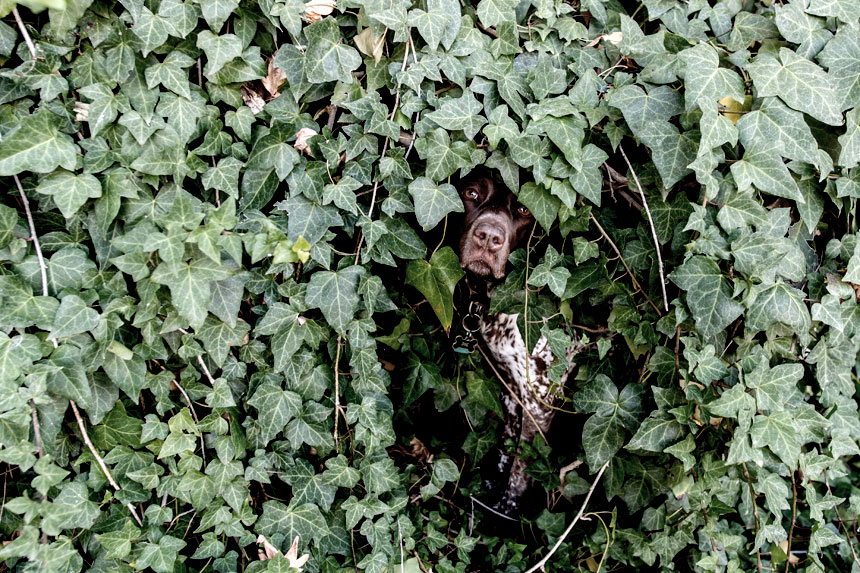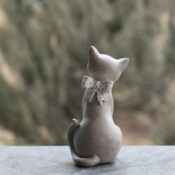Each day on his way to work in the basement of Somerset Bank, Ignatius Jones skirted around the mosaic map on the lobby floor. Superstitious to the core, he knew the map warned not only about demons and dragons sinking hapless Portuguese caravels in ancient uncharted waters but also, even today, all others who strayed off course. His wariness of life’s hidden dangers led to a life of skittish resignation.
His one joy, besides aligning numbers in his ledgers, was the house his mother bequeathed him. His one weakness, the vines of nasturtiums — his mother’s favorites — that romped among his orderly rows. Everything else in his back garden, including the grass lopped at a height of three-quarter inches, he measured with a ruler.
One evening, while his chicken stew simmered, Ignatius audited his garden from the back deck. There, in the middle of a row of green peppers, a feather and claw sprouted from a new mound. “No!” He clutched his chest and gasped. With a ragged breath, he ran to collect a shovel from its carefully drawn outline on the garage wall. The loose dirt yielded a still-glistening dead starling that rolled out of the earth in one bedraggled piece. “How could … why would …?” He sucked his bottom lip.
Ignoring the splashes and happy shrieks of children coming from his neighbor’s pool, he buried the bird behind the white enclosure in back of his garage. A dog barked in the distance.
The first mound had just fuzzed over with newly seeded grass when he spotted another grave. As Ignatius put his foot and weight on the shovel, out came a bra — black, low-cut, and padded with a twisted underwire. Sandy soil drizzled from the double-D cups. He felt his face grow hot, and the shovel clattered to the ground. He bolted over to the trash bin behind the garage and flung the nasty thing in.
At the sound of twigs cracking, he spun around. A rosebush to the left fluttered, and he glimpsed a mid-sized dog with a white chest blaze. The tops of its ears flopped forward as though half-listening. It swiveled away and disappeared into the neighbor’s overgrown jungle. Damn dogs. Damn kids! He plodded back to his garage and placed the shovel inside its wall outline. His world re-ordered.
The next morning, Ignatius was so deep in thought, he cut himself shaving. On the drive into work, he ran three yellow lights. When he skittered through the bank’s foyer, the northern polar cap of the world map was inches from his sole. He glanced down, gulped, and hurtled off. His hands trembled as he poured his morning coffee to precisely an inch from the rim.
Days later, on a drizzly evening, Ignatius found a third mound in front of his mother’s precision-pruned roses. Could it be she was sending him a ghostly message? The incongruity of him, who only believed in facts and numbers, even thinking such an absurd thought rankled. He scraped off the topsoil, gingerly brushed the heap with the backside of the rake, and uncovered a shredded baby’s blanket. He dug a deeper hole nearby, pulled the blanket over with pliers, and then stomped it in place as he sweated profusely.
That very night, Ignatius became Sentinel Jones stationed on his back deck with flashlight and broom ready to repel marauders. The wind rustled and a distant pool filter chug-chugged. He glimpsed movement, in the deepest shadows: the hind end of a fleeing dog or perhaps child?
Throughout those hot weeks of brown-leafed zucchini plants and neglected tomato vines, only the flourishing nasturtiums carried on as usual. They rampaged like the neighbor’s wild children beneath the now scruffy rose bushes. At work, Ignatius — distracted and exhausted — no longer completed his assignments in a timely, tidy way.
Mounds continued to appear, and soon his backyard resembled a failed archeological dig. Ignatius unearthed from one mound the limp, still-warm body of a kitten with rust-red stains on its muddied fur. His knees buckled. He laid the soft fluff into a new grave in the ever-growing cemetery behind the white compost enclosure. The next day, another mound entombed an eggbeater like his mom once used. He flung it into the trash. A few days later, he found among the nasturtiums a half-buried heart-red alarm clock. After burying the clock with its dying tock-tock, he tossed the shovel into the garage where it dinged off its outline and clanged to the floor.
One evening, when a beach ball slid through his thick side hedge, he marched over to his neighbor with the ball under his arm and the other hand on his hip. “Why are your children persecuting me?”
The man, startled, turned from lighting his grill. “Do I know you?” He called over his sons, dripping and grinning, to face the neighbor they’d never spoken to.
Ignatius turned toward the two boys with fists clenching and unclenching. “Why are you burying stuff in my yard?”
“Why would we?” said one. The young boy wrapped blue-tinged arms across his goose-pimpled chest.
The father laid a protective hand on each of their shoulders.
“Then it’s your dog.” Ignatius stepped toward them.
“Don’t got one, Mister.”
The father moved in front of his sons, and his glower forced Ignatius from the porch.
Along the border between the two houses, a black dog with protruded ribs and a pinch-eyed look slunk around the corner. Ignatius turned toward the man shepherding his boys into the house then back where the dog had been. He stomped home and slammed the front door shut.
So addled by the mysterious backyard disasters, Ignatius would forget to keep close to the wall that skirted the great mosaic map. More than once, he traipsed dangerously close to Tasmania or New Zealand’s Stewart Island before bolting off. His reports lost their accuracy, and his supervisor became a constant presence in his cubicle. Desperate to take a day or two off to catch the mangy culprit in action, Ignatius practiced his lies as he mangled his numbers. “I feel sick, sir,” or “my auntie died.” He thought saying mother or father would be too severe, too likely to reap unwanted attention. The receiving of sympathy cards or — horrors — a wreath would be well beyond his ability to cope. During work breaks he scoured the internet to price electric fencing, pellet guns, and a high-volume irrigation system, but his accountant’s heart quivered at the expense.
On Sunday night, when he pulled into his driveway, the pinch-eyed dog loped in front of him. Ignatius, in an impromptu assassination attempt, floored the accelerator. He missed the dog but not the garage door. Shards from the headlight speared into the wood. He slunk down in the seat, eventually peering over the steering wheel to see if someone had heard or curtains moved. He slid from the driver’s seat and beetled into his house. From behind his kitchen curtains, he surveyed the twining nasturtiums, his pink Lady May Rose with its yellow edgings and a new mound with a handle of a child’s toy sticking out. Was that dog mocking him? All too much. He could no longer tell from the minefield before him where his garden ended and chaos began. He poured the brandy he kept for company that never came and stared out the kitchen door to the bleakness beyond.
Monday, with his tie askew and his top button unfastened, he waited at the bank of elevators. One of the tellers walked past him and stopped. She frowned and shook her head. Tucking her papers under her arm, she leaned forward and fastened his top shirt button. She joggled his tie straight. Her perfume wafted over him.
So deftly, so quickly, that a full moment passed before his hands flew and fluttered in front of him. She, the small slip of a blonde with bow-shaped lips, second teller from the right, had touched him and walked away. The earth quaked under him.
Still scarlet ten minutes later, he poured his ritual coffee of the day one inch from the mug’s top. This time he ladled in three teaspoons of sugar instead of his usual half.
The solemn-eyed new colleague in the adjacent cubbyhole stood and leaned over their mutual barrier. “Jones? It’s Jones, isn’t it?”
Ignatius swiveled around and his chair caromed off the front of his desk. Two manuals fluttered to the floor, and coffee sloshed over him.
“Hey. Didn’t mean to startle you,” the man said. “I’m Matt.”
Ignatius mumbled his reply into his keyboard.
“Didn’t catch that,” Matt chirped.
Ignatius stared at his quivering hands on the keyboard, up to the monitor, then back at his hands before whispering, “Ignatius.”
“You’re joking!” Matt shook his head and said, “No wonder you go by Jones.”
Ignatius glanced up.
“You sick? Don’t look so good.” Matt leaned away. “Got something contagious?”
The cup slurped in Ignatius’s hand, and his knees rattled against his metal desk. Matt called their supervisor, who scrutinized Ignatius’s coffee-soaked clothes and ebbing color and sent him home. On his way out of the bank, he plodded over Hudson Bay and the Great Lakes.
In the morning, he slipped through the bank’s heavy glass entrance and was halfway across the lobby before he dared a glance toward the second teller’s window. No lithe little blonde with the turned-up studded nose and watermelon-red lips.
He sighed from relief.
He sighed from disappointment.
He sighed for what might have been.
Just then she popped up from behind her counter and his right foot landed on Queensland, Australia. She smiled and waved. There, halfway to the elevator, on the precise epicenter of Albatross Bay, Cape York Peninsula, Northern Territory, Ignatius melted.
He faltered two more steps and lurched into the sea where monsters and dragons waited on a direct line to Asia with its jagged edges. Surely, her little waggling wave wasn’t for him. He glanced behind him. No one. She fluttered another wave and disappeared back under her counter.
Back in his cubicle, Ignatius shoved two chocolate chip cookies in his mouth, dumped half the bowl of sugar into his coffee, and did a tentative drum roll with the palms of his hands against the countertop. Other accountants popped up from their cubicles and stared. One said hello. Ignatius repeated the word. It left him with a strange sensation, not unpleasant, but most definitely different. The muscles on either side of his mouth contracted and his lips spread in an upward curve. Was he smiling?
Later, when he pulled into his driveway, the dog with the half-bent ears and the pinch-eyed look sat on his front steps. Ignatius slammed on his brakes, threw open the door, and barreled from the car. “Wait. Wait!” But the fur-tangled creature loped down the street.
Another mound. This time he didn’t dive into his garage for his shovel or rake. He didn’t stand by the shrubby jungle between his house and the neighbor’s yard to lurk and listen. This time, he went into the kitchen and loosened his tie. Her touch. He unbuttoned his shirt — feeling the warmth of her delicate fingers brushing his throat.
He pulled two individually wrapped steaks from the freezer and put them in the microwave to defrost. When one was ready, he slid it into a frying pan, added a pinch of salt, a bit of garlic and set the burner on medium heat. The other he plopped into a pie plate inherited from his mother and never used and microwaved until it was semi-cooked. He brought it out to the front porch and placed it on the top step. Under the branches of the neighbor’s low-lying shrub, a flicker of movement and a just-audible whine as a pair of eyes over a black muzzle watched.
Become a Saturday Evening Post member and enjoy unlimited access. Subscribe now




Comments
What a pleasant story. Can see why it earned third place. Superstitious loner bound to routine discovers a vulnerable side he most likely never knew he had.
This story was very appealing! The story of a shy, superstitious person finally discovering there is more to life than work
I liked this! Very well done! Great illustration of what a little caring connection can do.